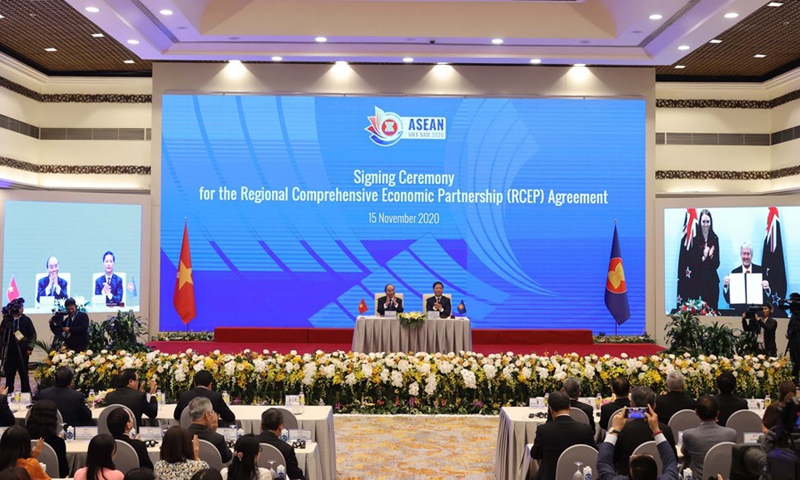RCEP redefines new era of globalization as US juggles its unilateral dilemmas
By Cheng Hanping Source: Global Times Published: 2020/11/15 22:23:41

The signing ceremony of the Regional Comprehensive Economic Partnership (RCEP) agreement is held via video conference in Hanoi, capital of Vietnam, November 15, 2020. Photo: Xinhua
The Regional Comprehensive Economic Partnership (RCEP), a free trade agreement initiated by ASEAN in 2012, was signed virtually on Sunday. The RCEP was originally between 10 ASEAN members and six other countries, namely China, Japan, South Korea, India, Australia and New Zealand.
RCEP is huge in size and covers a wide range of issues from trade in goods, dispute settlement, and investment in intellectual property, digital trade, finance and telecommunications. Although India decided to withdraw from RCEP negotiations due to disputes over tariffs and trade deficits with other countries, the remaining 15 members have been working hard. They eventually signed the world's largest trade pact.
RCEP will create the world's largest free trade zone. The signing of the agreement also has many special meanings. Usana Berananda, Thailand's director-general of the Department of ASEAN Affairs, said on November 5 that this will be the first-ever virtual signing of an agreement that ASEAN has undertaken. RCEP has become even more important with the COVID-19 pandemic still raging. All countries need to seek more extensive cooperation in the context of the public safety crisis. The signing of RCEP is a major victory of multilateralism over unilateralism, and an inevitable choice for participating countries to deal with challenges in a fast-changing world.
Going forward, the Asia-Pacific region will be further integrated and reach in-depth cooperation like never before. RCEP will help China and ASEAN enhance strategic mutual trust and cooperation, promoting a community for a shared future for both sides.
It also shows that China and ASEAN have the responsibility to jointly fight against anti-globalization and trade protectionism, and strive to bring bright prospects to the region and the world. Despite the severe economic impacts of COVID-19, the trade volume between China and ASEAN has risen against the downward trend. In fact, ASEAN overtook the EU to become China's largest trading partner during the January-June period.
The signing of RCEP also echoes well with China-proposed Belt and Road Initiative (BRI) to promote regional integration and further strengthen policy communication with countries along the BRI. Based on the Joint Leaders' Statement on the RCEP issued in November 2019, they agreed to directly promote the connection of facilities with BRI construction. It is believed that the China-Laos railway and the China-built Jakarta-Bandung high-speed railway will soon bring benefits to people in the region.
Obviously, the BRI brings mutual benefits. In the critical period of fighting COVID-19, the BRI has shown its unique advantages between China and ASEAN.
However, the signing of RCEP will be a blow to the Trump administration, which has hyped up trade frictions at all costs. This explains why Marc Knapper, US deputy assistant secretary for Korea and Japan, said Japan and South Korea "should be able to stand up and speak out when we see bad behavior from China."
Faced with RCEP's signing, Washington has very few options left. One of the options is that once Joe Biden takes office, the US may return to the Trans-Pacific Partnership (TPP) which former president Barack Obama had promoted. But after the US' withdrawal, TPP has already been changed into the CPTPP - Comprehensive and Progressive Agreement for Trans-Pacific Partnership.
Being "comprehensive" and "progressive," CPTPP has become more feasible. Previously, the TPP was mainly focused on trade, but CPTPP also includes investment. The 11 members of CPTPP are all members of APEC, and they share a common will for further development. The US is only an outsider in the CPTPP. If it chooses to return to the partnership, will it be willing to accept the position as a newcomer? Or will it show its arrogance again?
The US is very likely to use all means, including confrontation, hostility and smear campaigns to interfere with RCEP's operations. Doesn't Knapper's move to incite South Korea and Japan explain it all?
If the US returns to CPTPP, Washington will try to turn it into a platform against RCEP. With growing populism and a paranoid Cold War mentality, the US is likely to continue its new economic and trade cold war with China. But the choice is not in the US' hands, but in the hands of CPTPP members. In a new era of globalization with win-win cooperation strategies, one must ask, will they abandon multilateralism and turn to unilateralism?
The author is senior research fellow and professor at the Collaborative Innovation Center of South China Sea Studies at Nanjing University. opinion@globaltimes.com.cn
Posted in: VIEWPOINT